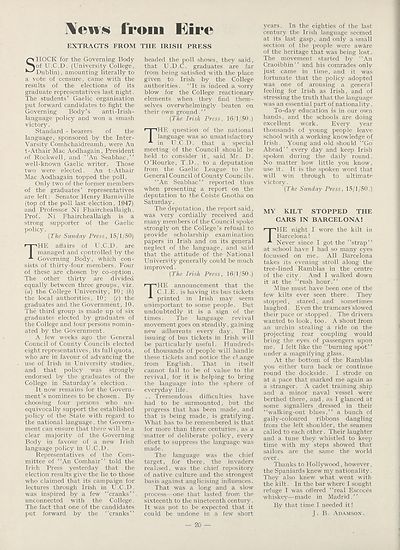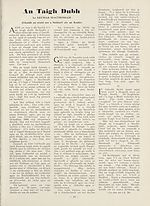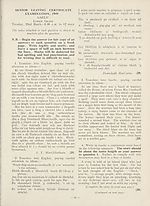An Comunn Gàidhealach Publications > Gaidheal > Volumes 44--45, January 1949--December 1950
(312) Page 20
Download files
Complete book:
Individual page:
Thumbnail gallery: Grid view | List view

Mews from Eire
EXTRACTS FROM THE IRISH PRESS
SHOCK for the Governing Body
of U.C.D. (University College,
Dublin), amounting literally to
a vote of censure, came with the
results of the elections of its
graduate representatives last night.
The students’ Gaelic organisation
put forward candidates to fight the
Governing Body’s anti-Irish-
language policy and won a smash
victory.
Standard - bearers of the
language, sponsored by the Inter-
Varsity Comhchaidreamh, were An
t-Athair Mac Aodhagain, President
of Rockwell, and “An Seabhac,”
well-known Gaelic writer. Those
two were elected. An t-Athair
Mac Aodhagain topped the poll.
Only two of the former members
of the graduates’ representatives
are left: Senator Henry Barniville
(top of the poll last election, 1947)
and Professor Ni Fhaircheallaigh.
Prof. Ni Fhaircheallaigh is a
strong supporter of the Gaelic
policy.
(The Sunday Press, 15/1/50)
THE affairs of U.C.D. are
managed and controlled by the
Governing Bocly, which con¬
sists of thirty-four members. Four
of these are chosen by co-option.
The other thirty are divided
equally between three groups, viz.
(a) the College University, 10; (b)
the local authorities, 10; (c) the
graduates and the Government, 10.
The third group is made up of six
graduates elected by graduates of
the College and four persons nomin¬
ated by the Government.
A few weeks ago the General
Council of County Councils elected
eight representatives, its full quota,
who are in favour of advancing the
use of Irish in University studies,
and that policy was strongly
endorsed by the graduates of the
College in Saturday’s election.
It now remains for the Govern¬
ment’s nominees to be chosen. By
choosing four persons who un¬
equivocally support the established
policy of the State with regard to
the national language, the Govern¬
ment can ensure that there will be a
clear majority of the Governing
Body in favour of a new Irish
language policy in U.C.D.
Representatives of the Com¬
mittee of “An Comhair’’ told the
Irish Press yesterday that the
election results give the lie to those
who claimed that its campaign for
lectures through Irish in U.C.D.
was inspired by a few ‘ ‘cranks ’ ’
unconnected with the College.
The fact that one of the candidates
put forward by the ‘ ‘cranks ’ ’
headed the poll shows, they said,
that U.D.C. graduates are far
from being satisfied with the place
given to Irish by the College
authorities. “It is indeed a sorry
blow for the College reactionary
elements when they find them¬
selves overwhelmingly beaten on
their own ground. ’ ’
(The Irish Press, 16/1/50.)
THE question of the national
language was so unsatisfactory
in U.C.D. that a special
meeting of the Council should be
held to consider it, said Mr. D.
O’Rourke, T.D., to a deputation
from the Gaelic League to the
General Council of County Councils.
“An Seabhac’’ reported thus
when presenting a report on the
deputation to the Coiste Gnotha on
Saturday.
The deputation, the report said,
was very cordially received and
many members of the Council spoke
strongly on the College’s refusal to
provide scholarship examination
papers in Irish and on its general
neglect of the language, and said
that the attitude of the National
University generally could be much
improved.
' (The Irish Press, 16/1/50.)
THE announcement that the
C .1 .E. is having its bus tickets
printed in Irish may seem
unimportant to some people. But
undoubtedly it is a sign of the
times. The language revival
movement goes on steadily, gaining
new adherents every day. The
issuing of bus tickets in Irish will
be particularly useful. Hundreds
of thousands of people will handle
these tickets and notice the change
from English. That in itself
cannot fail to be of value to the
revival, for it is helping to bring
the language into the sphere of
everyday life.
. . Tremendous difficulties have
had to be surmounted, but the
progress that has been made, and
that is being made, is gratifying.
What has to be remembered is that
for more than three centuries, as a
matter of deliberate policy, every
effort to suppress the language was
made.
The language was the chief
target, for there, the invaders
realised, was the chief repository
of native culture and the strongest
basis against anglicising influences.
That was a long and a slow
process—one that lasted from the
sixteenth to the nineteenth century.
It was pot to be expected that it
could be undone in a few short
years. In the eighties of the last
century the Irish language seemed
at its last gasp, and only a small
section of the people were aw&re
of the heritage that was being lost.
The movement started by “An
Craoibhin’’ and his comrades only
just came in time, and it was
fortunate that the policy adopted
was one of arousing a general
feeling for Irish as Irish, and of
stressing the truth that the language
was an essential part of nationality.
To-day education is in our own
hands, and the schools are doing
excellent work. Every year
thousands of young people leave
school with a working knowledge of
Irish. Young and old should “Go
Ahead ’ ’ every day and keep Irish
spoken during the daily round.
No matter how little you know,
use it. It is the spoken word that
will win through to ultimate
(The Sunday Press, 15/1/50.)
MY KILT STOPPED THE
CARS IN BARCELONA!
HE night I wore the kilt in
Barcelona!
Never since I got the “strap’’
at school have I had so many eyes
focussed on me. All Barcelona
takes its evening stroll along the
tree-lined Ramblas in the centre
of the city. And I walked down
it at the “rush hour.”
Mine must have been one of the
few kilts ever seen there. They
stopped, stared, and sometimes
laughed. Even the tramcars slowed
their pace or stopped. The drivers
wanted to look, too. A shout from
an urchin stealing a ride on the
projecting rear coupling would
bring the eyes of passengers upon
me. I felt like the ‘ ‘burning spot ’ ’
under a magnifying glass.
At the bottom of the Ramblas
you either turn back or continue
round the dockside. I strode on
at a pace that marked me again as
a stranger. A cadet training ship
and a minor naval vessel were
berthed there, and, as I glanced at
some signallers dressed in their
“walking-out blues,” a bunch of
gaily-coloured ribbons dangling
from the left shoulder, the seamen
called to each other. Their laughter
and a tune they whistled to keep
time with my steps showed that
sailors are the same the world
Thanks to Hollywood, however,
the Spaniards knew my nationality.
They also knew what went with
the kilt. In the bar where I sought
refuge I was offered “real Escoces
whiskey—made in Madrid. ’ ’
By that time I needed it!
J. B. Adamson.
EXTRACTS FROM THE IRISH PRESS
SHOCK for the Governing Body
of U.C.D. (University College,
Dublin), amounting literally to
a vote of censure, came with the
results of the elections of its
graduate representatives last night.
The students’ Gaelic organisation
put forward candidates to fight the
Governing Body’s anti-Irish-
language policy and won a smash
victory.
Standard - bearers of the
language, sponsored by the Inter-
Varsity Comhchaidreamh, were An
t-Athair Mac Aodhagain, President
of Rockwell, and “An Seabhac,”
well-known Gaelic writer. Those
two were elected. An t-Athair
Mac Aodhagain topped the poll.
Only two of the former members
of the graduates’ representatives
are left: Senator Henry Barniville
(top of the poll last election, 1947)
and Professor Ni Fhaircheallaigh.
Prof. Ni Fhaircheallaigh is a
strong supporter of the Gaelic
policy.
(The Sunday Press, 15/1/50)
THE affairs of U.C.D. are
managed and controlled by the
Governing Bocly, which con¬
sists of thirty-four members. Four
of these are chosen by co-option.
The other thirty are divided
equally between three groups, viz.
(a) the College University, 10; (b)
the local authorities, 10; (c) the
graduates and the Government, 10.
The third group is made up of six
graduates elected by graduates of
the College and four persons nomin¬
ated by the Government.
A few weeks ago the General
Council of County Councils elected
eight representatives, its full quota,
who are in favour of advancing the
use of Irish in University studies,
and that policy was strongly
endorsed by the graduates of the
College in Saturday’s election.
It now remains for the Govern¬
ment’s nominees to be chosen. By
choosing four persons who un¬
equivocally support the established
policy of the State with regard to
the national language, the Govern¬
ment can ensure that there will be a
clear majority of the Governing
Body in favour of a new Irish
language policy in U.C.D.
Representatives of the Com¬
mittee of “An Comhair’’ told the
Irish Press yesterday that the
election results give the lie to those
who claimed that its campaign for
lectures through Irish in U.C.D.
was inspired by a few ‘ ‘cranks ’ ’
unconnected with the College.
The fact that one of the candidates
put forward by the ‘ ‘cranks ’ ’
headed the poll shows, they said,
that U.D.C. graduates are far
from being satisfied with the place
given to Irish by the College
authorities. “It is indeed a sorry
blow for the College reactionary
elements when they find them¬
selves overwhelmingly beaten on
their own ground. ’ ’
(The Irish Press, 16/1/50.)
THE question of the national
language was so unsatisfactory
in U.C.D. that a special
meeting of the Council should be
held to consider it, said Mr. D.
O’Rourke, T.D., to a deputation
from the Gaelic League to the
General Council of County Councils.
“An Seabhac’’ reported thus
when presenting a report on the
deputation to the Coiste Gnotha on
Saturday.
The deputation, the report said,
was very cordially received and
many members of the Council spoke
strongly on the College’s refusal to
provide scholarship examination
papers in Irish and on its general
neglect of the language, and said
that the attitude of the National
University generally could be much
improved.
' (The Irish Press, 16/1/50.)
THE announcement that the
C .1 .E. is having its bus tickets
printed in Irish may seem
unimportant to some people. But
undoubtedly it is a sign of the
times. The language revival
movement goes on steadily, gaining
new adherents every day. The
issuing of bus tickets in Irish will
be particularly useful. Hundreds
of thousands of people will handle
these tickets and notice the change
from English. That in itself
cannot fail to be of value to the
revival, for it is helping to bring
the language into the sphere of
everyday life.
. . Tremendous difficulties have
had to be surmounted, but the
progress that has been made, and
that is being made, is gratifying.
What has to be remembered is that
for more than three centuries, as a
matter of deliberate policy, every
effort to suppress the language was
made.
The language was the chief
target, for there, the invaders
realised, was the chief repository
of native culture and the strongest
basis against anglicising influences.
That was a long and a slow
process—one that lasted from the
sixteenth to the nineteenth century.
It was pot to be expected that it
could be undone in a few short
years. In the eighties of the last
century the Irish language seemed
at its last gasp, and only a small
section of the people were aw&re
of the heritage that was being lost.
The movement started by “An
Craoibhin’’ and his comrades only
just came in time, and it was
fortunate that the policy adopted
was one of arousing a general
feeling for Irish as Irish, and of
stressing the truth that the language
was an essential part of nationality.
To-day education is in our own
hands, and the schools are doing
excellent work. Every year
thousands of young people leave
school with a working knowledge of
Irish. Young and old should “Go
Ahead ’ ’ every day and keep Irish
spoken during the daily round.
No matter how little you know,
use it. It is the spoken word that
will win through to ultimate
(The Sunday Press, 15/1/50.)
MY KILT STOPPED THE
CARS IN BARCELONA!
HE night I wore the kilt in
Barcelona!
Never since I got the “strap’’
at school have I had so many eyes
focussed on me. All Barcelona
takes its evening stroll along the
tree-lined Ramblas in the centre
of the city. And I walked down
it at the “rush hour.”
Mine must have been one of the
few kilts ever seen there. They
stopped, stared, and sometimes
laughed. Even the tramcars slowed
their pace or stopped. The drivers
wanted to look, too. A shout from
an urchin stealing a ride on the
projecting rear coupling would
bring the eyes of passengers upon
me. I felt like the ‘ ‘burning spot ’ ’
under a magnifying glass.
At the bottom of the Ramblas
you either turn back or continue
round the dockside. I strode on
at a pace that marked me again as
a stranger. A cadet training ship
and a minor naval vessel were
berthed there, and, as I glanced at
some signallers dressed in their
“walking-out blues,” a bunch of
gaily-coloured ribbons dangling
from the left shoulder, the seamen
called to each other. Their laughter
and a tune they whistled to keep
time with my steps showed that
sailors are the same the world
Thanks to Hollywood, however,
the Spaniards knew my nationality.
They also knew what went with
the kilt. In the bar where I sought
refuge I was offered “real Escoces
whiskey—made in Madrid. ’ ’
By that time I needed it!
J. B. Adamson.
Set display mode to:
![]() Universal Viewer |
Universal Viewer | ![]() Mirador |
Large image | Transcription
Mirador |
Large image | Transcription
| An Comunn Gàidhealach > An Comunn Gàidhealach Publications > Gaidheal > Volumes 44--45, January 1949--December 1950 > (312) Page 20 |
|---|
| Permanent URL | https://digital.nls.uk/127125780 |
|---|
| Description | This contains items published by An Comunn, which are not specifically Mòd-related. It includes journals, annual reports and corporate documents, policy statements, educational resources and published plays and literature. It is arranged alphabetically by title. |
|---|
| Description | A collection of over 400 items published by An Comunn Gàidhealach, the organisation which promotes Gaelic language and culture and organises the Royal National Mòd. Dating from 1891 up to the present day, the collection includes journals and newspapers, annual reports, educational materials, national Mòd programmes, published Mòd literature and music. |
|---|---|
| Additional NLS resources: |
|

